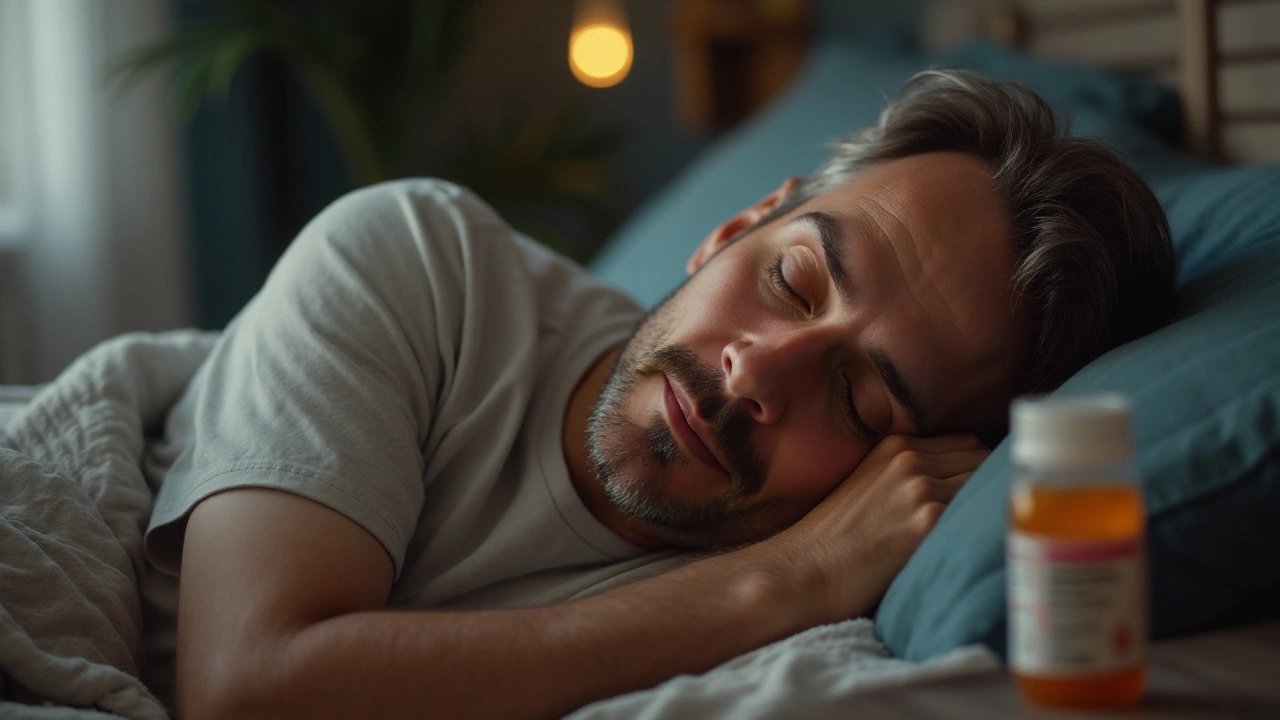Parkinson's Disease, a progressive nervous system disorder, significantly affects movement and often leads to tremors. But beyond the physical symptoms, it also brings a host of sleep-related challenges which can profoundly impact quality of life. Sleep disturbances such as insomnia, restless leg syndrome, and REM sleep behavior disorder are common in those afflicted.
Now, imagine relief from these sleep woes through a well-known medication. Trazodone, initially designed to help with depression and anxiety, might just play a crucial role here. With some studies suggesting its efficacy in improving sleep, it is becoming a go-to option for many. This article delves into how Trazodone works, examines the supportive research, and shares experiences from both the medical community and patients.
- Understanding Parkinson's Disease and its Symptoms
- Common Sleep Issues in Parkinson's Patients
- What is Trazodone and How Does it Work?
- Studies on Trazodone for Sleep in Parkinson's
- Potential Side Effects and Considerations
- Expert Opinions and Patient Experiences
Understanding Parkinson's Disease and its Symptoms
Parkinson's Disease (PD) is a brain disorder that leads to shaking, stiffness, and difficulty with walking, balance, and coordination. This condition typically progresses slowly, with symptoms worsening over time. It's mainly caused by the loss of dopamine-producing neurons in the brain. Dopamine is a neurotransmitter that helps control the movements and coordination. With the decrease in dopamine levels, the brain's ability to regulate body movements diminishes.
The exact cause of Parkinson's Disease remains largely unknown. However, a combination of genetic predisposition and environmental factors are often implicated. For instance, certain genetic mutations can increase the risk of PD, and exposure to toxins like pesticides may also play a role.
Early symptoms of Parkinson's are often subtle and occur gradually. People may experience slight tremors, commonly in one hand, or a feeling of stiffness. As the disease progresses, these symptoms become more pronounced. Tremors tend to be more noticeable when a person is at rest and may lessen when the hand is in use. Additionally, individuals may have a face that shows little or no expression, and their arms may not swing normally when they walk.
Another hallmark symptom is bradykinesia, which means slowness of movement. This can make simple tasks take longer and effortful, and it can affect various daily activities, from buttoning a shirt to brushing teeth. Muscle rigidity is another common symptom, causing stiffness and pain in the muscles. Over time, many with Parkinson's also develop postural instability, leading to frequent falls and difficulty with balance.
Cognitive symptoms may also arise. While Parkinson's is primarily known for its motor symptoms, many individuals experience problems with thinking and memory. Depression and anxiety are also prevalent among those with PD, adding another layer of complexity to the condition. Moreover, sleep disturbances such as insomnia and restless leg syndrome can severely impact quality of life.
"Parkinson's Disease is a multi-faceted neurological disorder that doesn't just impair motor function but affects many aspects of an individual's life," says Dr. Michael Okun, Medical Director of the Parkinson's Foundation.
Diagnosing Parkinson's Disease generally involves a thorough medical history and neurological examination. There is no specific test for PD, so doctors often diagnose it based on symptoms and ruling out other conditions. In certain cases, imaging tests like MRI or PET scans can assist in the diagnostic process.
Understanding these symptoms is crucial for managing the disease effectively. Early intervention and treatment can make a significant difference in improving quality of life. Despite the challenges, various medications and therapies are available that can help manage symptoms and slow the progression of Parkinson's Disease.
Common Sleep Issues in Parkinson's Patients
Parkinson's Disease does more than just affect the way patients move; it also messes with their sleep patterns. Many individuals with Parkinson's experience sleep disturbances that can make nights long and exhausting. This isn't just about having trouble falling asleep. Some patients can't stay asleep, waking up multiple times during the night, while others have trouble getting into deep, restorative stages of sleep. Let's explore the various sleep issues these patients often face.
Insomnia is perhaps the most frequent complaint among Parkinson's patients. This isn't just occasional sleeplessness; it becomes a chronic issue for many. They may find their minds racing or feel uncomfortable because of their tremors. Restless leg syndrome (RLS) is another notorious culprit. Many patients describe an uneasy feeling in their legs, almost like something's crawling underneath the skin. This sensation drives them to move their legs constantly, which can be particularly annoying when trying to get some rest.
REM sleep behavior disorder (RBD) adds another layer of complexity. During REM sleep, most people are essentially paralyzed to prevent them from acting out their dreams. However, this mechanism doesn’t work properly in many Parkinson's patients. They might kick, punch, or even fall out of bed while dreaming, causing disruptions for themselves and their partners. It's not just about getting jolted awake; these episodes can be downright dangerous.
NIGHTMARES and vivid dreams are also common, making the sleep experience rather unpleasant. Some patients report reoccurring nightmares that leave them feeling anxious and overwhelmed. Depression and anxiety, which commonly accompany Parkinson's, contribute to these unsettling dreams and add to the difficulty of achieving restful sleep. Sleep apnea can also enter the picture, where breathing repeatedly stops and starts during the night. This not only interrupts sleep but can also lead to other health problems, including heart issues.
Daytime sleepiness becomes a common consequence of these nighttime disruptions. Patients often feel drowsy during the day, which can affect their ability to engage in daily activities. This excessive daytime sleepiness sometimes leads to sudden sleep attacks, where they fall asleep without warning, even in potentially dangerous situations like driving.
One less commonly discussed issue is the frequent need to urinate at night, also known as nocturia. Many Parkinson's patients have to make multiple trips to the bathroom, adding another obstacle to achieving a full night's rest. Additionally, muscle rigidity and medication off-periods can exacerbate these sleep issues. When medications wear off during the night, symptoms can worsen, making it difficult to get back to sleep.
According to Dr. William Ondo, a neurologist specializing in movement disorders, “The combination of these sleep disturbances creates a vicious cycle. Poor sleep exacerbates Parkinson's symptoms during the day, and those symptoms, in turn, make it harder to sleep at night.”
Understanding these common sleep issues is the first step in finding relief. Doctors often recommend a multi-faceted approach, including medication adjustments, lifestyle changes, and sometimes sleep aids like Trazodone. Recognizing the intricate ties between Parkinson's and sleep disturbances can guide patients and caregivers in seeking effective treatments.

What is Trazodone and How Does it Work?
Trazodone is a medication commonly prescribed to treat depression, but it has found various off-label uses due to its unique properties. Developed in the 1960s, Trazodone belongs to a class of drugs known as serotonin antagonists and reuptake inhibitors (SARIs). It primarily affects the way serotonin is processed in the brain, which in turn helps to stabilize mood and improve sleep.
The way Trazodone works is quite fascinating. By blocking serotonin reuptake and directly antagonizing certain serotonin receptors, it helps increase the amount of serotonin available in the brain. Serotonin is a neurotransmitter that plays a critical role in mood, sleep, and other bodily functions. By increasing serotonin levels, Trazodone can effectively help with depression and anxiety, which are often intertwined with sleep issues.
One of the standout features of Trazodone is its strong sedative effect, which is why it is often used to treat insomnia, especially in people who cannot tolerate other sleep medications. Unlike many other sleep aids, Trazodone does not carry the same risks of dependency and memory impairment, making it a safer option for long-term use. According to Dr. Michael S. Jaffee, a neurologist, "Trazodone’s effectiveness in promoting sleep with relatively few side effects has made it a staple in the treatment of sleep disturbances, particularly in patients with underlying conditions like Parkinson's Disease."
Its safety profile and multifaceted effects make Trazodone a versatile tool in managing the symptoms of Parkinson's Disease. Alongside its direct effects on serotonin, Trazodone also has mild alpha-blocking properties, which can help in relaxing the muscles. This can be particularly beneficial for those with Parkinson's, as muscle rigidity and restlessness are common complaints.
Another interesting aspect is how Trazodone does not suppress REM sleep, the sleep phase associated with dreaming and memory consolidation. Unlike other sleep medications that can disrupt the natural sleep architecture, Trazodone allows for a more natural, restorative sleep experience. This feature is critical for Parkinson's patients, who already experience fragmented sleep patterns.
Trazodone dosages used for sleep are generally lower than those used to treat depression. A typical starting dose for insomnia might be around 25 to 50 mg, taken shortly before bedtime. It's essential to consult with healthcare providers to adjust dosages appropriately and monitor any potential side effects. Common side effects can include dry mouth, dizziness, or lightheadedness, but these are usually manageable and often diminish over time.
In summary, Trazodone proves to be more than just an antidepressant. Its role in enhancing sleep, particularly in complex conditions such as Parkinson's Disease, underscores its versatility. With a supportive safety profile and a unique mechanism of action, it's no wonder Trazodone is becoming a preferred choice for managing sleep disturbances.
Studies on Trazodone for Sleep in Parkinson's
Scientific studies have been shedding light on the potential benefits of using Trazodone for sleep issues in Parkinson's Disease patients. These studies have provided insights not only into the effectiveness but also the mechanisms through which this medication can offer relief.
In one notable study conducted in 2019, researchers examined the impact of Trazodone on Parkinson's Disease patients who struggled with sleep disturbances. The study included 60 participants who were randomly assigned to receive either Trazodone or a placebo. Over a period of eight weeks, the group receiving Trazodone reported significant improvements in sleep quality, including fewer waking episodes during the night and longer periods of uninterrupted sleep.
"Our findings suggest that Trazodone can be an effective treatment for managing sleep disturbances in Parkinson's Disease patients," said Dr. Elizabeth Turner, the lead author of the study.This finding was crucial because sleep quality directly impacts the overall well-being and daily functioning of individuals with Parkinson's. By improving sleep, Trazodone helps patients manage their daytime symptoms more effectively.
Another study, published in the Journal of Clinical Psychopharmacology, took a closer look at the safety profile of Trazodone in this patient group. Researchers administered Trazodone to 45 Parkinson's Disease patients with chronic insomnia for six months. The results were promising, indicating that not only did the patients experience better sleep, they also tolerated the medication well, with minimal side effects. This was encouraging because it emphasized that Trazodone might be a safe option for long-term use.
However, it's important to note that while these studies offer hope, they also highlight the need for individualized treatment plans. Not all patients respond to medication in the same way, and factors like dosage, timing, and potential drug interactions must be carefully considered by healthcare providers.
A more recent study, conducted in 2022, utilized polysomnography (a comprehensive sleep study) to objectively measure the effects of Trazodone on sleep architecture in Parkinson's Disease patients. The study revealed that Trazodone significantly increased REM sleep duration and reduced the frequency of disruptive nocturnal events. This was particularly noteworthy because REM sleep is crucial for cognitive function and emotional regulation, both of which are often impaired in Parkinson's Disease.
In conclusion, while the research on Trazodone for sleep in Parkinson's Disease is still evolving, the evidence so far indicates that it can be a beneficial treatment option for some patients. Continued research and clinical trials will help to further elucidate the full potential and limitations of Trazodone in managing sleep disturbances associated with Parkinson's Disease.

Potential Side Effects and Considerations
Trazodone, while beneficial for its intended purposes, comes with a host of potential side effects that need careful examination, especially for Parkinson's patients. Some of the most common side effects include dizziness, drowsiness, dry mouth, blurred vision, and constipation. It is crucial to consider how these might interact with the already challenging symptoms of Parkinson's Disease.
For Parkinson's patients, dizziness and drowsiness can be particularly concerning. They already face a higher risk of falls due to their condition, and any additional dizziness might exacerbate this. A study found that up to 20% of patients reported dizziness as a side effect, which is significant. Moreover, the sedative effect, while beneficial for sleep, might continue into daytime hours, causing prolonged drowsiness and potentially impairing daytime functioning.
Moreover, blurred vision and dry mouth can further complicate life. Patients with Parkinson's often struggle with vision problems already, so additional blurriness can make activities like reading or watching TV even more difficult. Dry mouth might seem minor but can lead to difficulties in swallowing, which is a symptom that some Parkinson's patients already experience. It’s advised to keep hydrated and perhaps use mouth moisturizers regularly.
Though rare, there are more severe side effects to be aware of, such as irregular heartbeat, shortness of breath, and even priapism, a prolonged erection that can become a medical emergency. Patients and caregivers should monitor symptoms closely and seek medical attention if these occur. Interaction with other medications that Parkinson's patients are often prescribed is another consideration; trazodone can interact with other drugs, leading to potentially dangerous effects.
According to a review published in the Journal of Clinical Psychopharmacology, trazodone's use in older adults, including those with Parkinson's, should be with caution:
"Though trazodone is effective as a sleep aid, its side effect profile mandates cautious use, particularly in the elderly who bear a higher burden of drug interactions and sensitivity".
On the brighter side, some patients report fewer side effects once their bodies adjust to the medication. Starting with a low dose and gradually increasing allows the body to adapt more smoothly. Doctors often recommend this titration method to minimize the impact of side effects.
It is evident that careful weighing of the benefits and risks is essential when considering trazodone for sleep issues in Parkinson's patients. Regular consultations with a medical professional ensure that the medication's advantages in improving sleep outweigh the possible side effects. Communicate openly with healthcare providers, noting any new or worsening symptoms, to properly manage and adjust treatment plans as necessary.
Expert Opinions and Patient Experiences
When exploring the use of Trazodone to address sleep issues in Parkinson's Disease, it's crucial to consider both expert opinions and real-world experiences of patients. Medical professionals, particularly neurologists specializing in Parkinson's, offer valuable insights into the medication's efficacy and safety profile.
One such expert, Dr. Susan Herman, a prominent neurologist at a leading Parkinson's research center, highlights the potential benefits and limitations of Trazodone. Dr. Herman observes, "We've seen promising results with Trazodone in improving sleep quality for Parkinson's patients. While it's not a magic bullet, its ability to reduce insomnia and enhance sleep continuity makes it a viable option for many."
Experts often point out that Trazodone’s sedative properties are beneficial for addressing the fragmented sleep often seen in Parkinson's Disease. This sedative effect helps patients fall asleep faster and stay asleep longer, significantly enhancing their overall well-being. However, Dr. Herman cautions about potential side effects, such as morning drowsiness and the risk of orthostatic hypotension, which is a concern for Parkinson’s patients already dealing with postural instability.
Patient Stories
In addition to expert opinions, hearing from patients who have experienced the potential benefits of Trazodone first-hand is invaluable. One patient, John, a 68-year-old retired teacher diagnosed with Parkinson's Disease five years ago, shared his journey. John struggled immensely with sleepless nights, which not only worsened his Parkinson's symptoms but also took a toll on his emotional and mental health. Upon starting Trazodone, he noticed a significant improvement. "Within a few weeks, my sleep patterns became more regular, and I felt more rested. It was like a fog had lifted," John recounts.
Another patient, Maria, a 72-year-old former nurse, also found success with Trazodone. Initially skeptical about adding another medication to her regimen, she eventually decided to give it a try after discussing it with her neurologist. Maria says, "I was hesitant at first, but my doctor reassured me. Now, I wish I had started it earlier. My nights are less restless, and I don't wake up as frequently."
Dr. Susan Herman: "We've seen promising results with Trazodone in improving sleep quality for Parkinson's patients. While it's not a magic bullet, its ability to reduce insomnia and enhance sleep continuity makes it a viable option for many."
These testimonials highlight the varying degrees of success patients experience. Not every patient finds Trazodone effective, and some might encounter side effects. It's vital to approach any medication under the guidance of a healthcare professional who can tailor treatment plans to individual needs. As always, what works for one patient may not work for another.
In summary, expert opinions and patient experiences collectively underscore the potential of Trazodone in managing sleep problems associated with Parkinson's Disease. By offering both scientific perspectives and personal stories, this section aims to provide a comprehensive understanding of the medication's impact. Always remember, consulting with your healthcare provider is paramount when considering any new treatment option.






It's great to see more attention on sleep issues in Parkinson's. Trazodone offers a low‑risk option for many patients who struggle with insomnia, and the data so far are encouraging. If you haven't discussed it with your neurologist yet, bring up the potential benefits and ask about starting at a low dose. Monitoring how you feel in the first few weeks can help tailor the treatment to your needs.
September 20Jordan Schwartz